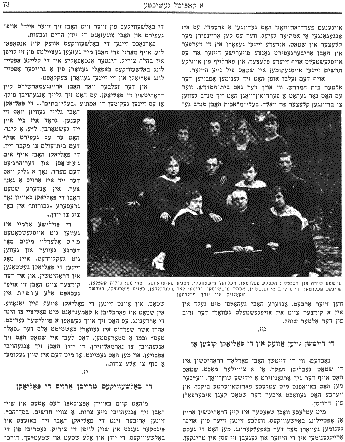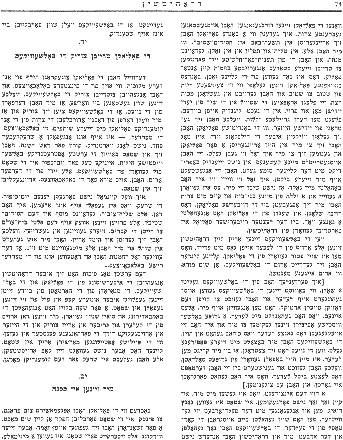Previous Page
|
Next Page
 [
Page 73
]
[
Page 73
]
them rented them from someone else who did. There was a real rush to bring the
most wood into town. Others traveled to the villages and transported whole
peasant houses to town; in the space of a few months many new houses were thus
erected in Drohitchin.
The old House of Study was
rebuilt the same way, as was the Street House of Study. Whoever had a horse and
wagon offered to bring wood from the forest. Artisans volunteered their
services, while others helped with money. In a short time the Old Synagogue was
rebuilt.
[Photo:] First row, from right: Heska Feldman, Velvel Mishovsky, Manya
Padarovsky. Second row: Gedaliah Kaplan, Sheinka Feldman, Chaim Leib
Eisenstein, Esther Mishkovsky. Third row: Leah Mendelson, Sonia Piasetsky,
Hershel Shkolnick and Yosef Feldman.
P.
The Germans leave, and the Poles arrive
After the Germans lost
Drohitchin, the city had no civilian government. The town quickly set up a
Jewish self-defense unit armed with a few rusty rifles, guarding against
attacks from outside of town.
A few weeks later, a group of
Bolsheviks came to town, and were well-received by the residents of town.
People took them in as guests in their homes, providing them with food and
drink. For their part, the Bolsheviks were very respectful, and made huge
promises to the Jews.
In the evening, the Bolsheviks
left for Antopolia, and the next morning we saw some of them running back to
town. In Antopolia the small group of Bolsheviks ran into a larger group of
Poles who beat them up.
The same week, the Poles
entered Drohitichin, and we had the feeling that the real "owners" of
Drohitchin were arriving. The Poles immediately showed us what they were made
of. A child died, and was being taken to the cemetery for burial. Some Poles
started shooting over the child, and killed the horse. Another lucky day that
Jews got through in one piece. In other cities, the Poles showed even greater
"bravery" in their relationship to Jews.
The Polish army was well
equipped with all types of weaponry and was well clothed. In one single day the
Poles were in Drohitchin and grabbed up all the chickens in town. That same
evening they left town for Yanovo. They left in town a commander and policemen
to maintain order, as well as a Polish court. Aharon Asher Shifra's was
appointed as mayor, and life in town started getting back to normal. The Jews
started getting their lives back together to the extent where they believed
that all their suffering would end.
Q.
The Bolsheviks drive out the Poles
People were scarcely able to catch their breaths when new trouble arrived.
Merely two short months after the Poles took over the Pinsk region, the
Bolsheviks drove them out. All the Jews in the cities and towns where

[
Page 74
]
the Poles passed through now faced enormous problems. I remember how on the
ninth of Av, a fast day and day of mourning, a gang of Poles burst into the
chassidic synagogue while we were attending the Minchah [Afternoon] Service in
stocking feet with phylacteries and prayer shawls. They then proceeded to go
after the livestock of the tired Jews, and take the animals to Antopolia. This
was one of the smaller events to occur. Gangs of armed Poles ran like wild
animals from house to house, looting and savagely beating Jews. They grabbed
the boots and shoes of every Jewish man and woman, while at night lying in the
attic, I could hear terrible wailing from Jewish homes where the Polish gangs
were pillaging the helpless Jews.
One day, a couple of Poles
burst into my house and demanded money. They went through my pockets, and when
they were dissatisfied with the small amount of money they found, they pointed
their guns at me, threatening to shoot me if I didn't show them where my money
was hidden. My family started crying, and only with great suffering were we
able to get the Poles to leave. The Poles' looting, beating and rape went on
for a whole week, until the last Polish thief was chased out of Drohitchin.
When the Bolsheviks arrived in
Drohitchin, everyone crawled out of their hiding places and went out on the
street with great joy at having gotten rid of the Poles. Small children trailed
after the Bolsheviks without any fear, as if they were one of us.
I suffered personal loss at the
hands of the Bolsheviks. As is known, the Bolsheviks were starving for leather
products, and were looking for any valuable item. I was identified as someone
who worked in the leather business, and a group of Bolshevik officers came to
my house, and I gave them all the leather I had. They paid me with their paper
money. When the news got around that I had leather, groups of soldiers came to
my house, and wouldn't leave until they had taken away the last bit of leather
I had buried in my garden.
Apart from that incident,
nothing else happened to me. Life was calm in town, and we continued with our
usual agricultural work. We were starting to harvest the potato crop, and the
Bolsheviks helped us with the work. None of us believed that the Bolsheviks
would stay in town forever.
R.
The Poles drive out the Bolsheviks
In the meantime, the Poles were
obtaining assistance from other countries, as well as from debtors, and started
driving out the Bolsheviks, who were already in Warsaw. When we heard the news
that the Bolsheviks were retreating, and that we would again have to face
suffering from the approaching Poles and their partners, the debtors and
murderers, we became terribly frightened. Not long thereafter, just before Rosh
Hashanah, we saw the first retreating Bolsheviks soldiers in town. A few days
before Yom Kippur Drohitchin was filled with Bolsheviks, and all the Jews from
surrounding villages flocked to town because of their fear of the debtors.
I will never forget that Yom
Kippur and the fear that fell upon all of us. I led the prayers for the Mussaf
services in the chassidic synagogue, and all the women had gone to the old
cemetery to "tear up" the graves; their crying and screaming tore the
heavens, and we heard it all in the synagogue, and started crying together with
them. We prayed to G-d to have mercy on us and save us from the murderous
debtors.
On the first day of Sukkot,
Drohitchin was caught in the crossfire between the Poles and Bolsheviks. Cannon
shells from both sides flew over our heads, and many landed in town. The
bombardment stopped for just a couple of hours, and things were quiet. We
climbed out of the cellars and ditches, and went back to our homes. Looking out
through the draped windows we saw Poles marching into town. No one dared stick
his head out the door, and we were all terrified about what the next day would
bring.
S.
We were in danger
When the Poles left for the
front in Pinsk, Drohitchin was without any government. There were a couple of
gendarmes on the Sand, but they provided little security for the town.
Previous Page
|
Next Page
This material is made available by JewishGen, Inc.
and the Yizkor Book Project for the purpose of
fulfilling our
mission of disseminating information about the Holocaust and
destroyed Jewish communities.
This material may not be copied,
sold or bartered without JewishGen, Inc.'s permission. Rights may be
reserved by the copyright holder.
JewishGen, Inc. makes no representations regarding the accuracy of
the translation. The reader may wish to refer to the original material
for verification.
JewishGen is not responsible for inaccuracies or omissions in the original work and cannot rewrite or edit the text to correct inaccuracies and/or omissions.
Our mission is to produce a translation of the original work and we cannot verify the accuracy of statements or alter facts cited.
 Drogichin, Belarus
Drogichin, Belarus
 Yizkor Book Project
Yizkor Book Project
 JewishGen Home Page
JewishGen Home Page
Yizkor Book Director, Lance Ackerfeld
This web page created by Lance Ackerfeld
Copyright © 1999-2026 by JewishGen, Inc.
Updated 10 Dec 2001 by LA
 [
Page 73
]
[
Page 73
]



